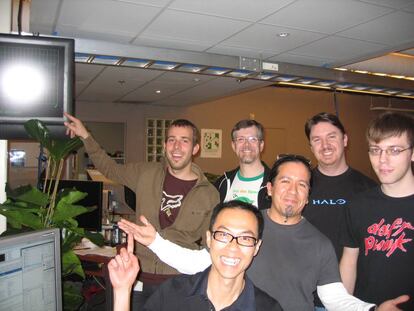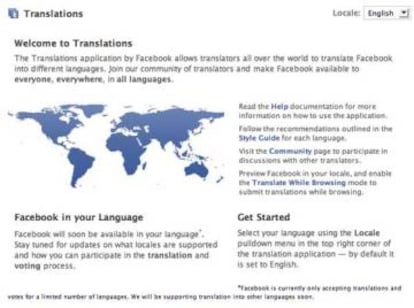Ten years of “Me gusta” – Facebook celebrates a decade in Spanish
Translation into the second language after English was key to expanding the social media network beyond the United States

Facebook is celebrating its 10th year in Spanish, buoyed by having broken the barrier of two billion active monthly users. The language was the first choice for translation of the site, and after English continues to be the most popular on the social network, being used by 290 million people. Around 80 million people use Facebook in European Spanish, which is officially called Castilian by the site.
Before being translated, the social media platform had just 400,000 Spanish members. A year later, that number jumped to four million. And today, 22 million Spaniards use the popular site.
Before being translated, the social media platform had just 400,000 Spanish members. A year later, that number jumped to four million
Facebook’s decision to focus on Spanish as the next most important language after English came about naturally. Firstly, it’s the second-most-used language in the company’s home state of California – it’s rare for a day to pass without hearing it spoken on the streets. And secondly, Javier Oliván, an engineer from the northeastern Spanish city of Huesca, was the first foreigner to join the team, and remains in charge of expanding Facebook beyond the United States.
In Spain, it took a while before the team got a formal office. Laura González-Estéfani, who later became country manager, was their first employee. The situation was the same across Europe, where employees were nomadic, almost like satellites, with a huge task ahead of them.

The formula chosen was to translate the site with the consensus of volunteers. The engineering part of the expansion team created a Facebook translating application (Translate Facebook). “It lets anyone around the world translate Facebook into different languages and includes an option to vote for translations done by other members that work well. When a particular translation is voted by enough people, the voting option closes and the chosen translation moves on to a final approval stage,” the company explains.
The creation of this application took several months. It was an investment in the future. A year later, Facebook was available in 40 languages. After Spanish came French. The translators had a usable version of the content only 24 hours after it was opened for contributions.
Facebook is now available in a range of minority languages, including Guaranaí (a Bolivian indigenous language), Corsican, Maltese and Fula, a language from West Africa that is spoken in Senegal, Cameroon and Sudan. In total, the site is offered in 100 different languages.
Many users demanded “Like” be translated as ‘Mola,’ a colloquialism from Spain that could be roughly translated as “awesome”
But Facebook continues to tinker with its translations. An active community continues to comment and debate on the adequate use of words, depending on the context. One of the most important discussions was about the “Like” button. Many users demanded it be translated as “Mola,” a colloquialism from Spain that could be roughly translated as “awesome,” but in the end “Me gusta” won out. “Poke” was left as “toque,” but that proved to be one of the more complicated translations.
Spanish communities took it upon themselves to help translate the site into Spain's regional languages, including Catalan, Galician and Basque.
Many members have successfully taken advantage of the opportunities on the site – both socially and financially. One standout is Mr Jeff, the owner of a Spanish laundromat startup which offers pick-up and delivery services. Around 40% of his business comes from Facebook.
Violiners, meanwhile, is a group of classical music lovers. In it, Javier García, its creator, posted a link to a newspaper article about Ameen Mokdad, a violinist who protested against Islamic State using his violin as his only weapon. Much to his surprise, he soon discovered that Mokdad himself was an active member of the group. Spain’s National Library, which is currently redesigning its website, was one of the first Facebook pages created in Spain. Today, it has more than 285,000 members.
English version by Laura Rodríguez.
Tu suscripción se está usando en otro dispositivo
¿Quieres añadir otro usuario a tu suscripción?
Si continúas leyendo en este dispositivo, no se podrá leer en el otro.
FlechaTu suscripción se está usando en otro dispositivo y solo puedes acceder a EL PAÍS desde un dispositivo a la vez.
Si quieres compartir tu cuenta, cambia tu suscripción a la modalidad Premium, así podrás añadir otro usuario. Cada uno accederá con su propia cuenta de email, lo que os permitirá personalizar vuestra experiencia en EL PAÍS.
¿Tienes una suscripción de empresa? Accede aquí para contratar más cuentas.
En el caso de no saber quién está usando tu cuenta, te recomendamos cambiar tu contraseña aquí.
Si decides continuar compartiendo tu cuenta, este mensaje se mostrará en tu dispositivo y en el de la otra persona que está usando tu cuenta de forma indefinida, afectando a tu experiencia de lectura. Puedes consultar aquí los términos y condiciones de la suscripción digital.








































